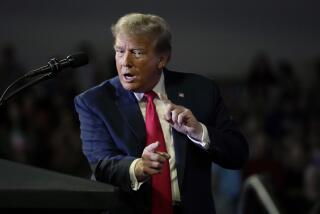NATO Solidly Behind Reagan on Arms
- Share via
GLENEAGLES, Scotland — Employing unusually tough language, defense officials of the NATO nations Wednesday turned aside potential disputes over the “Star Wars” program and the balance of forces in Europe and endorsed President Reagan’s approach to arms control.
The officials agreed to hold Soviet leader Mikhail S. Gorbachev to the promise made at his first summit with President Reagan in November, 1985, that an agreement limiting medium-range nuclear weapons in Europe would not be linked to agreements on other nuclear and space-based weapons.
Defense Secretary Caspar W. Weinberger said the two-day meeting of the North Atlantic Treaty Organization’s Nuclear Planning Group ended with “a very high degree of unity” within the alliance.
Senior officials traveling with him noted that some members of the alliance are often exercised over U.S. efforts to enlist their support in anti-Soviet campaigns. But on Wednesday, the allies joined the United States in a statement that appeared to take a bare-knuckles approach, at least by the usual standards of diplomatic documents.
Called on Leadership
The statement said the defense ministers “called on the Soviet leadership to reaffirm its commitments not to hold an . . . agreement (on intermediate-range weapons) hostage to any other agreement. A failure to do so would destroy the credibility of the highest Soviet assurances.”
The intermediate-range weapons are the U.S. Pershing 2 and ground-launched cruise missiles and the Soviet SS-20 missiles that have been deployed in Europe.
The NATO statement expressed “warm appreciation” of Reagan’s “conduct of the talks and fully endorsed his bold attempt to seek far-reaching arms control agreements with the Soviet Union” at his meeting with Gorbachev earlier this month in Reykjavik, Iceland.
The long-scheduled NATO meeting coincidentally followed by barely a week the hastily arranged summit conference between Gorbachev and Reagan. That meeting ended when the Soviet leader insisted that agreements to reduce both strategic nuclear weapons and intermediate-range weapons should be tied to agreements limiting to the laboratory any research on space-based missile defense systems, specifically President Reagan’s Strategic Defense Initiative, or “Star Wars.”
Direct Pressure
As Weinberger flew back to Washington from Scotland, concluding a 19-day, 27,000-mile tour that included stops in Alaska, Hong Kong, China, India, Pakistan, Egypt, Italy and Germany, senior officials were in a congratulatory mood, asserting that with the statement approved Wednesday, the alliance intends to put direct pressure on Gorbachev.
One senior Pentagon official, speaking on the condition that he not be named, said some participants in the meeting were concerned that the language in the statement “took a personal poke at another leader.”
And another official described the statement as one of the toughest he had seen come out of such meetings, which routinely try to minimize with bland language any differences that crop up behind closed doors.
Before the meetings began, one official said, there was concern in the American delegation that the defense ministers would be reluctant to support Reagan’s refusal to go along with the limits that Gorbachev proposed on the Strategic Defense Initiative.
In addition, he said, “we’d been reading that the Europeans were very concerned we were decoupling the United States from Europe,” in effect undercutting the U.S. guarantee that it would protect its allies with a “nuclear umbrella.” Reagan’s apparent willingness at Iceland to eliminate all intermediate-range weapons from Europe had triggered widespread concern.
More to Read
Sign up for Essential California
The most important California stories and recommendations in your inbox every morning.
You may occasionally receive promotional content from the Los Angeles Times.













